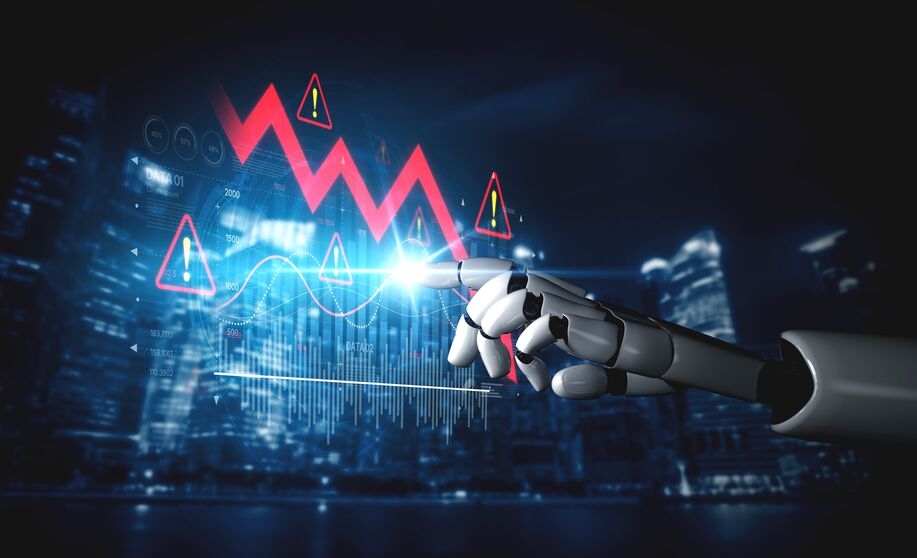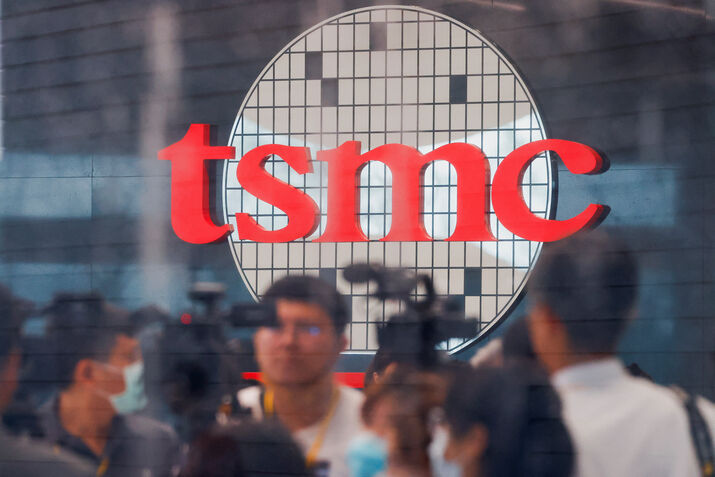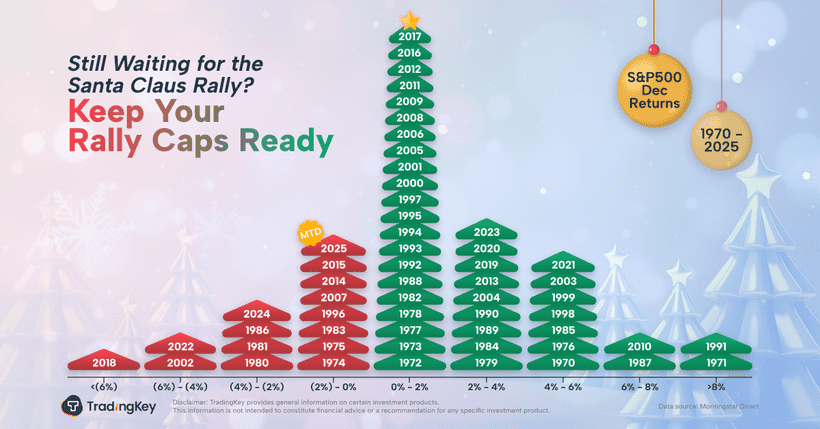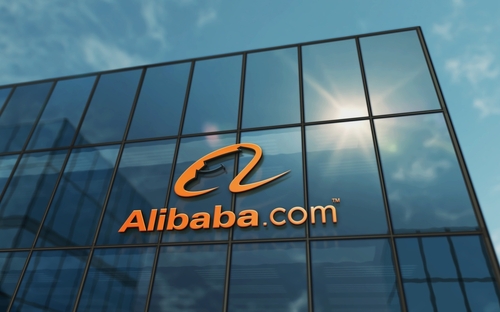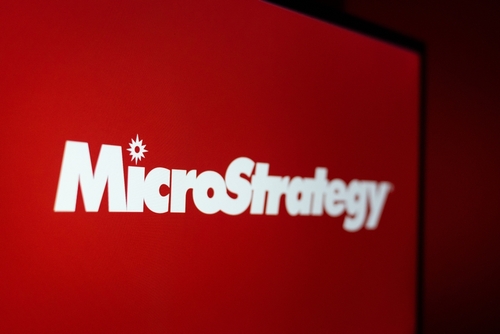A Robinhood Look Back at 2024 and Forward Into the Future
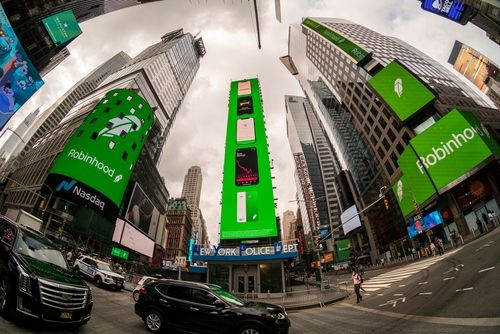
In this podcast, Motley Fool analyst David Meier and host Mary Long discuss:
- What merger rumors signal about Nissan's business. (Note: This podcast was recorded before Nissan and Honda announced their plans.)
- How retailers are leaning into the holiday spirit.
- Advice for a seasonal decoration company.
Then Stephanie Guild, Robinhood's head of investment strategy, joins Motley Fool host Ricky Mulvey to discuss her outlook for 2025 and what's excited Robinhood investors in the past year.
Start Your Mornings Smarter! Wake up with Breakfast news in your inbox every market day. Sign Up For Free »
To catch full episodes of all The Motley Fool's free podcasts, check out our podcast center. To get started investing, check out our beginner's guide to investing in stocks. A full transcript follows the video.
Don’t miss this second chance at a potentially lucrative opportunity
Ever feel like you missed the boat in buying the most successful stocks? Then you’ll want to hear this.
On rare occasions, our expert team of analysts issues a “Double Down” stock recommendation for companies that they think are about to pop. If you’re worried you’ve already missed your chance to invest, now is the best time to buy before it’s too late. And the numbers speak for themselves:
- Nvidia: if you invested $1,000 when we doubled down in 2009, you’d have $362,166!*
- Apple: if you invested $1,000 when we doubled down in 2008, you’d have $48,344!*
- Netflix: if you invested $1,000 when we doubled down in 2004, you’d have $491,537!*
Right now, we’re issuing “Double Down” alerts for three incredible companies, and there may not be another chance like this anytime soon.
See 3 “Double Down” stocks »
*Stock Advisor returns as of December 23, 2024
This video was recorded on Dec. 18, 2024.
Mary Long: It's not a car crash, it's consolidation. You're listening to Motley Fool Money. I'm Mary Long, joined today by David Meier, somewhat of a car guy, David Meier, I should say, which is how you described yourself just in the pre-recording. David, how are you this morning?
David Meier: I'm doing well. Thank you. How are you?
Mary Long: I'm doing great. Good to be here. We'll kick today off talking about two carmakers. Hence, the somewhat of a car guy comment. Honda and Nissan are in talks to join forces. We're unsure at the moment what exactly this would look like, whether it's a merger, an acquisition, maybe some holding group situation. But the market likes this news for Nissan. Stock is up 17% this morning. David, you got any immediate takes on this? What did you think when you first saw this headline this morning?
David Meier: I literally did a double take when I saw the headline flash across Bloomberg TV this morning, and I was like, wait. What? This is a bit of a surprise. It's not every day that you see two large Japanese companies, and I'll stress Japanese for now, want to merge. In fact, in my 20 years of investing, I don't think I've ever seen two Japanese companies talking about merging. I talked about this on the Morning show as well on Wednesday the 18th. I asked a fellow Fool and a more experienced international investor, and our friend Bill Mann. I was like, dude, does this com in? He was like, No, it's not. In fact, he mentioned that in Japanese business cultures, mergers like this are more of an admission that something has gone very wrong.
Mary Long: Even just if you go back a few years, it seems like there's been quite a bit going wrong at Nissan. Listeners might remember the name Carlos Gone. He was Nissan's then chairman. He was arrested in November 2018 for financial crimes. He denied those charges. He escaped on a jet about a year later, right before his trial began. It's not just man on the loose type issues that Nissan's face. They've also had financial problems, too. Operating income for the first half of the fiscal year was down 90% from the year ago, period. It's US sales fell 2% in the most recent quarter, 2% compared to 90% sounds minimal, but neither is good. Two part question here, focusing on what's gone wrong. First of all, why is Nissan so in the slumps? Then I'll just give you the second question right off the bat. Why does Honda want that baggage?
David Meier: The first one is a really good question, and I think the first place to look is competition. Competition in the global auto sales business is fierce. Let's say you come out with new models for the year, and they don't resonate with car buyers. Guess what? You've made a lot of investments. You've tied up a lot of inventory, and it's sitting on the lot, which is costing the dealership money as well. In a situation like that, your sales growth is extremely challenging. What do you do in order to boost sales? Well, you can discount the price, which that blows up the model because that's not what you were expecting when you made all the investments, or you can offer financing deals.
Either way, both of those hurt margins, and that's one of the things that we're seeing at Nissan over the last few years. Margins have been contracting, and that is never a good thing for an automaker because they operate on thin margins. If we look at what's the cash flow statement at Nissan, what story is that telling? Well, we see the operating cash flow generated by the company has been coming down while CAPEX, capital expenditures, the investment the company needs to make every year in order to keep its factories going, is staying high. Again, operating cash flow or cash coming in the door, falling is not a good thing. You never want to be in that position, especially when you know you have to make these huge investments. Getting to the second question, which is, why does Honda want Nissan's baggage? I can tell you right now they don't want the baggage. That's not what they're after in a merger like this.
But Honda is actually an incredible operator. If you look at their financial statements over the last 10 years, it is amazing how consistent their margins are. They're thin. They're not making all that much profit, but they're consistently positive. Perhaps the thinking in this is, hey, if Honda and Nissan merge, the single entity could be a stronger competitor in the global marketplace, i.e, they would have more share. Then in the process, Honda could take its operations know-how and transfer it over to Nissan's operations and hopefully help clean up their margin story.
Mary Long: You talk about this declining operating cash flow and this flatter CAPEX. What can Nissan or if it's Honda that's taking this on? What can they do to write those patterns?
David Meier: The first thing that you need to do is, again, making sure that the inputs, where the cash flow is coming into your business from, you have to make sure though all those are working. One of the interesting things I saw on Nissan's cash flow statement is their sales receivables have declined significantly. What is a sales receivable? When somebody buys a car, they typically finance it. The finance becomes the receivable on Nissan's balance sheet. What Nissan then does is it sells that to a third party, typically some financial institution and says, hey, I want the cash now, so I'll give you a little bit of a discount on this loan. But you take care of the loan. You can have the cash flows that come in. Cash today, for selling off a loan.
If that's not working, and that was a big part of Nissan's business model in the past, that's very bad. It could be because you're discounting those loans aggressively in order to get them off the books, or it could be that there's just no buyers out there, and you might even have to keep them on the books, which is not what a car dealer a car maker wants to do. That's the first from what's the first thing you got to do? You got to make sure that you have the product that people want. You're selling it for a good price, and that you're giving loans that are attractive to outside buyers if you want to get them off your balance sheet. Not the easiest thing in the world to do.
Mary Long: With Nissan having trouble offloading those loans to other buyers, do you think that that's a Nissan problem, or is that an industry problem right now?
David Meier: Well, it's probably more of a Nissan problem, because if we look at others, I don't see the same margin profile. I have seen cash flows, operating cash flows coming down at other car makers. Maybe it's an industry problem as well. But right now, at least from what I'm seeing in Nissan's statement, it's affecting Nissan more than it seems to be affecting others.
Mary Long: Going to pivot stories for a moment. The holidays are just around the corner, and CNBC was out this morning with a story about how retailers are hoping consumers spend big on holiday decorations despite being budget conscious in other areas. Before we dive into this a little bit, David, is the Meier house decked out with holiday decor?
David Meier: Minimally. Our daughter is grown and out of the house. We take much more of a minmalist approach. We do have some nice lighting, pretty much all white lights that look nice on the house. But no, we definitely don't go all out like we used to when she was younger.
Mary Long: I was going to say, is this to suggest that once upon a time you took a maximalist approach?
David Meier: Oh, my goodness, yes. We had lights everywhere on places on the roof where I should have never been, as well as lawn ornaments throughout the front yard and the backyard.
Mary Long: Wow. I am uncovering facts about you that I did not know. It sounds like you were the house to go to, like, stand out with perhaps in your Nissan Leaf out front and watch, like, the lights sync up to music, etc.
David Meier: Oh, I could, so I love, by the way, I absolutely love those videos on YouTube, of the engineers who were able to sync up the music and the lights. If I could have done that, I would have. Let's put it there. [laughs]
Mary Long: Consulting firm Deloitte is a piece of this story. They have an annual holiday spending survey, and that report found that consumers are prioritizing decorations, the maximalist David Meier approach, if you will, over gifts [laughs] this holiday season. Retailers are trying to lean into this. Walmart's got a six-foot tall white nutcracker that nearly sold out before Halloween. Home Depot has Santas and reindeers in addition to more basic decor. If consumers are spending less on gifts this year, do you expect retailers to get the bounce that they want and perhaps need from decorations? Is that enough to replace what would typically be spent on holiday gifts?
David Meier: Mike girl is definitely telling me, no, there 's no way that decoration expenditures could fill the hole if there was a big one in terms of gifts. The biggest reason is, look even though my house and yard was full, there's really only so much you can do in terms of decorations. But that said, I, too, have seen lots of those bigger decorations. They're in our neighborhood. I have friends in other places who are saying, oh, my gosh, look at the size of this Santa. They're taking pictures of neighbors in their neighborhoods. Those extra large decorations seem to be a very big hit this year from the half a dozen data points that I've collected.
Mary Long: Something that sticks out to me in this is that a lot of these are reusable, and so you don't necessarily have to buy new decorations each year. The National tree Company sells artificial Christmas trees, wreaths, and garlands online to retailers like Coles, Macy's, Amazon, Home Depot, you name it. Their CEO, Chris Butler, told CNBC that sales have been slowing in the past two years. After having surged during peak pandemic time, they've slowed. Again, it seems to me like this is a tough business, whether it's lights or wreaths or garlands, a lot of people use the same stuff year over year. Say the National tree Company brings you on as chief E.L.F, what ideas do you have to bring this business back into the green?
David Meier: Oh, my goodness. That's so awesome. That's a great question. Let me just say, I did not know of the National Tree Company before you brought it up. They may be already doing some of these things, and I wouldn't be earning my chief ELF consultant keep. But I think the first thing that I would be thinking is, hey, we got to move beyond the Christmas holiday. There should be trees decorated for every occasion. That's the first thing. Don't get bogged down in a seasonality type thing. Then the second thing, which, again, I would imagine they're doing this, I totally view the tree as the razor and the razor blade. The tree is the razor. It's the thing you buy, and you should be selling all sorts of different razor blades based on all those various occasions that we mentioned above. It's not just occasions.
Let's say it's the start of basketball season, and my daughter now lives in Cleveland. Why not decorate the tree Cleveland Cavaliers ornaments, or maybe sprinkling half Cleveland Cavaliers, half Cleveland Browns if you're both a basketball and football fan. Birthday, all these things. Part of the reason of my answer is we actually have an artificial tree that doesn't have any fake needles or anything like that. It's essentially just wood. It's really easy to assemble. You can put the ornaments on and the lights on, and everything is just so clear. It could really do more than we should be breaking it out more than just at the Christmas time because it's a wonderful little showcase piece in the home whenever anybody comes over.
Mary Long: David Meier, it sounds to me like you have certainly earned your keep as Chief ELF. Not only are you pro maxed out Christmas light decor, but now you're advocating for year round holiday decorations. Thanks so much for coming down from the North Pole to join us today on Motley Fool Money. Really appreciate having you.
David Meier: Thank you so much, Mary. This was so much fun.
Mary Long: This is the season for end of year look backs and 2025 predictions. Up next, Stephanie Guild, Robinhood's head of Investment Strategy, joins Ricky Mulvey for a look at what's exciting to Robinhood investors, why stuff thinks we're in a paradigm shift, and what rocks she's looking under as we head into a new year.
Ricky Mulvey: Steph, you recently wrote in your 2025 outlook "it's important to always maintain a mix of optimism and curiosity and investing". I really like that because you do need to be a long term rational optimist. If you're going to play this game, we'll break this question into two parts. Right now, what are you curious about?
Stephanie Guild: I'm very curious about things that are happening with respect to the chips and semi-conductors, the stuff that is going to power AI. The recent announcement, for example, from Google on their quantum oriented chip just starts to blow my mind because they actually threw words in there like another dimension. It's the things that you read about if you start to get into spiritual aspects and even watching recently, I watched the movie Interstellar. I've been sort of thinking about those things. That is what I'm really curious about is the future way of life versus how it works today.
Ricky Mulvey: Once you start doing chips that measure particle uncertainty rather than ones and zeros, it does make us start wondering if we're going into a parallel universe to tap into these different computing devices, it's a wild time to be alive.
Stephanie Guild: Or we already have the power to do that and we just don't know yet, like the particles and how they act when they're watched versus when they're not watched. Like, that is just.
Ricky Mulvey: For those listening, this is the Schrodinger's cat thing that allows a lot of these quantum chips to work, and that's basically it was an experiment from a while ago a thought experiment. You open a box and you don't know if the cat is alive or dead until you open the box, and the act of observing is what decides that. That is true on a universal level, and that is a lot of what's powering these chips. I don't know if that's something that scares me or makes me optimistic. Steph, what are you optimistic about as we wrap up 2024 and head into the new year?
Stephanie Guild: A lot of things. I think it's and the reason why I wrote what I wrote is because so often, I've witnessed and experienced people who I learned a lot from that tend to just take a viewpoint of, I think it's natural in your brain to look for risks. You're always looking for the risks. You certainly need to keep that type of mind. But I think all too often sometimes, many people will use that as the only way to view something, and then you can miss things. If you're always looking for what could go wrong. I think it almost hearkens back to, like, the Stone ages when we had to really focus. That's like embedded in our brain. But if you stay optimistic, I think you can find opportunities.
You obviously always have to think about the risk, but something to answer your question, is the fact that we are in, I think, a paradigm shift that has rid of a lot of the problems that we've seen over the last 30 years. It doesn't mean that we don't have more coming and have more today, and I can identify a lot of them. But we are in, to me, the fourth soft landing economically since 1960. The last one was in the 90s. I think it is as a result of a combination of having a global financial crisis, then having, it was a terrible global pandemic and just having a lot of things flushed out and shifting perspectives.
Along with that, you've had huge technological advances, a large amount of R&D. CAPEX has been growing faster than sales growth across the S&P. To me, it's a perfect confluence of things, plus an environment that for a long time unhealthily had very low interest rates. I think today, like, having interest rates is a good thing in our economy. I think there's a lot to be optimistic about.
Ricky Mulvey: When you said we're going through a paradigm shift right now, what specifically are you talking about? Is that the soft landing? Is that interest rates? I want to dig into what you're talking about there.
Stephanie Guild: It is the fact that typically, if you look back in history, you might expect that we would be in a place where now unemployment should start to rise. The Fed raised rates, the most they've raised rates in almost two decades. Many people thought we should have had a recession from that, and we didn't. I just think there are a lot of underlying aspects to our economy that are making it just be better than we could have imagined. That's why I think we have you have an environment where I said, companies are not necessarily cutting labor force despite the fact that their interest rates had increased.
Perhaps it was a blessing that came from the fact that interest rates were super low for so long, they got to fund things well into the future at very low interest rates. Science has just really advanced us. When you put all those things together, I think it just creates an environment where you have a balance of a lot of things. Like, all the risks are in balance with the rewards. Nothing's perfect. I can point out a lot of risks that could come, but I just think we are in that sweet spot right now.
Ricky Mulvey: You see a lot of individual investors over at Robin Hood on the app. Any data about how retail investors have been acting this year? I don't know. How long on average are folks holding stocks? Are you noticing anything interesting as you've looked at the user data on Robin Hood?
Stephanie Guild: Yeah, a few things. One, we see customers. This is at an aggregate level. I'm not looking at individual holdings at all. There are the matics within what they hold, and they tend to hold core positions in them. Then they trade around the volatility of these core positions. The core positions tend to land in a couple of different the matics, one being the large cap tech almost utility companies of this generation. The electric vehicle theme, Certainly chips and anything sort of AI related. You've got some travel in there, I'd say, like, there's a theme of travel, whether it be airlines, cruiselines, cannabis is also a theme.
Ricky Mulvey: Cannabis is back this year?
Stephanie Guild: It's just a theme that's been prevalent in the mix. We have the Robin Hood Investor Index, and this is what I analyze month to month. It takes the 100 largest, most owned. I shouldn't say largest, but most owned companies, and then assigns a weight to them based on the aggregate weight that our customers assigned to it within their portfolios, no matter how much money they have. That's how we figure out, like, what people are focused on.
The number 1 has been Tesla for a long time. I would say that since the election, we've seen definitely an exaggeration of those themes and playing on those themes. The new one, or I'd say, the one that has grown is anything crypto oriented. You've seen them trade around the volatility of Tesla. You could tell they were getting focused on other things for a while. But then as soon as the election hit, they increased their holdings right before that. The other thing I've seen, and I don't know if it's a function I think it's a function of our customer base slowly getting older. Like, the median age is 34. Several years ago that was 30 and before that it was in their 20s. Now you do see also an uptake of just purchasing broad based index funds, and that wasn't necessarily, something that we saw pretty consistently before. That's like in the last year or so.
Ricky Mulvey: We love index funds. It's a great way to diversify. When you say trading around volatility, does that mean buying high and selling low or is it doing the opposite? What do you mean by trading around volatility?
Stephanie Guild: I'd say the opposite. Like, our customers have certainly earned my respect because what I see is that something goes down and they're not afraid to use it to add to positions. Then if and when it bounces back, which is often eventually does, then they use it to trim. Put the capital elsewhere. On the margin. You don't see, like, all of a sudden Teslas in the index, and then it's out of the index, but it's on the margin.
Ricky Mulvey: As we look forward to 2025, you mentioned a Peter Lynch quote, which is the person who turns over the most rocks wins the game. I hope we're in a stock pickers market. It's the basis of the show that we're doing on Motley Fool Money. But what rocks? What sections of the garden do you recommend that retail investors start looking over?
Stephanie Guild: It's a good question. Where I'm most focused is away from the Top 10 names. The 10 largest stocks make up about 37, 38%, depending on the day that you're looking at it of the S&P 500. For 2026, they're expected to have earnings growth of 6%. That is not crazy, especially compared to where they've been over the last couple of years. It's been double digits, and those stocks have been driving the earnings growth for the entire S&P for several years now. But I do think that there are going to be a widening. It's why I think we're in a stock pickers market.
Like when I look below that surface, I think the mid-cap space is to me, I call it and I didn't put this in my outlook, but the midcap space to me is like the middle child. Like, it gets ignored. Everyone at post election, it was all about small caps. That's come off the boil a little bit. I think the mid-cap space is a good mix of lower valuations than large caps, but a little better mix of sectors and a little better balance sheet, meaning, leverage is a little lower than in the small cap space on average. I think there is other places like where I've been focused is I tend to think of the world in factors.
Growth versus value versus quality, and those things that we've self defined in our team. Where I've been looking matches this approach of widening. Looking at, like, growth, but at the right price or also known as GARP, or even just looking for value. Now, looking for something just based solely on valuation is usually not the best way to invest because things can stay cheap for a long time. Things can stay expensive "for a long time". An example, to me, of a GARP stock is Salesforce or Ticker CRM. That company, to me, has been a little bit up until the last earnings call, a little unfavored, trades at a reasonable valuation versus other tech names in the space. They're just starting to come into using AI to their benefit with their things called Agent Force.
Ricky Mulvey: AI Agent Force. Maniov learned a lot about I think when he rolled his ankle scuba diving or had some leg injury, and then he was getting all into AI Agent force to the investors. Yes.
Stephanie Guild: There's three things that I always look at when I think about investing, and I think of what's the direction of interest rates? Because that can affect valuations? I think they'll be around here within a range. What is the earnings growth expectations and then sentiment? Sentiment, does everybody love it? That's what you know, I always that's what I care most about, because if everybody thinks something is great, the bar has just gotten really high, always liking it to if somebody tells you about a movie, and they think oh, this is the best movie you have to watch and you go see it, and you're like, that was good. But you had too many people telling you it was good. I think about investing the same way, at least in the short term. I think CRM fits a lot of the things that I like to look for, but I think it was something like 73% of analysts now have a buy rating. It has been higher in the past, but it's not unloved, like some other names that are out there.
Mary Long: As always, people on the program may have interest in the stocks they talk about, and the Motley Fool may have formal recommendations for or against Trot Buyer sell stocks based solely on what you hear. All personal finance content follows Motley Fool editorial standards and are not approved by advertisers. The Motley Fool only picks products that it would personally recommend to friends like you. I'm Mary Long. Thanks for listening. We'll see you tomorrow, Fools.
John Mackey, former CEO of Whole Foods Market, an Amazon subsidiary, is a member of The Motley Fool's board of directors. David Meier has no position in any of the stocks mentioned. Mary Long has no position in any of the stocks mentioned. Ricky Mulvey has positions in Home Depot. The Motley Fool has positions in and recommends Amazon, Home Depot, Salesforce, Tesla, Walmart, and e.l.f. Beauty. The Motley Fool has a disclosure policy.



